The war on drugs is a relentless battle fought on multiple fronts – law enforcement, education, and rehabilitation.
Across the globe, governments and organisations work tirelessly to combat substance abuse, yet the fight is far from over. Drug addiction does not discriminate; it affects individuals, families, and entire communities.
Recognising the urgent need for proactive measures, regional initiatives like the Youth Network on Drugs Prevention Programme (YNDPP) have been established to empower young people with the knowledge and tools to make a difference.
Brunei, committed to maintaining its drug-free status, has sent four dedicated youth representatives to take part in this vital mission.
Twenty-two-year-old Ghazi Al-Ghifari bin Haji Sani, a second-year student pursuing a Bachelor’s Degree in Mathematical Science at Universiti Teknologi Brunei (UTB), is one of the four students selected to represent Brunei at the 4th YNDPP.
Organised by The Office of the Narcotics Control Board (ONCB) of Thailand, this prestigious 10-day programme, taking place in Thailand and Cambodia, is designed to promote regional cooperation in drug prevention through knowledge sharing and collaboration among youth.
Ghazi attributes his selection to his deep curiosity and keen interest in drug-related topics and prevention efforts in Brunei. Reflecting on what sparked his passion, he recalls the impactful roadshows conducted by the Narcotics Control Bureau (NCB) during his secondary school years.
“I have always been curious about drug prevention here, and I remember NCB’s roadshow vividly – it left a lasting impression on me. I believe my curiosity played a major role in my selection,” he shared.
UNDERSTANDING DRUG PREVENTION BEYOND BORDERS
The YNDPP provides a platform for youth from 12 participating countries to discuss the drug abuse situation in their respective nations and exchange ideas on prevention strategies.
As part of his preparations, Ghazi conducted extensive research on drug-related issues in Brunei to ensure he could effectively contribute to discussions and answer questions from fellow participants.
He is particularly eager to understand the severity of drug abuse in other countries, especially those with high cases, such as Thailand and Malaysia.
“From my research and the information I gathered, I learned that many young people, including those in higher learning institutions, experiment with drugs out of curiosity.
“Many simply want to follow trends or fit in with a certain group, which is quite alarming,” he observed.
Ghazi strongly believes that youth should seek healthier ways to cope with personal struggles.
“No matter how many problems they are facing – be it mental health issues or family problems – there are ways to overcome them without resorting to harmful substances.
“I encourage young people to explore their passions, engage in spiritual activities, and find positive outlets for their emotions,” he urged.

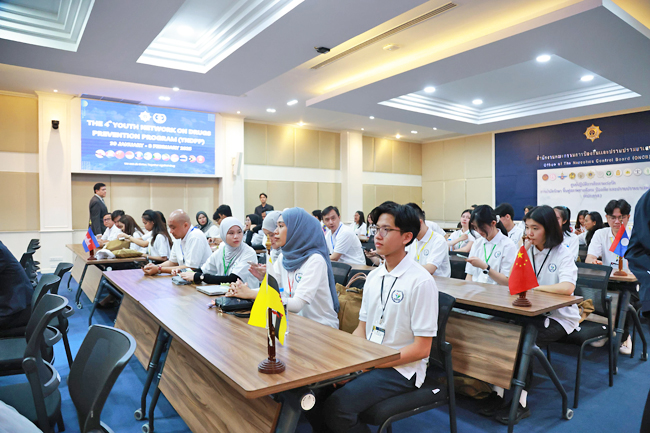
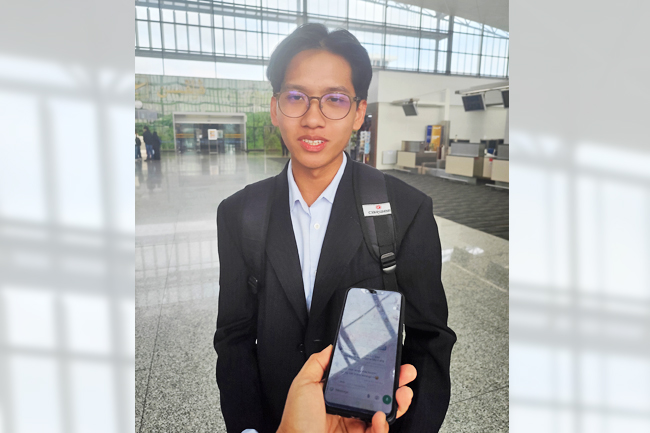
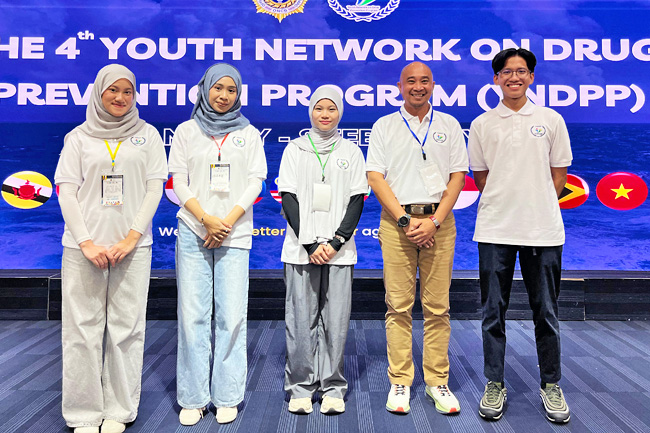
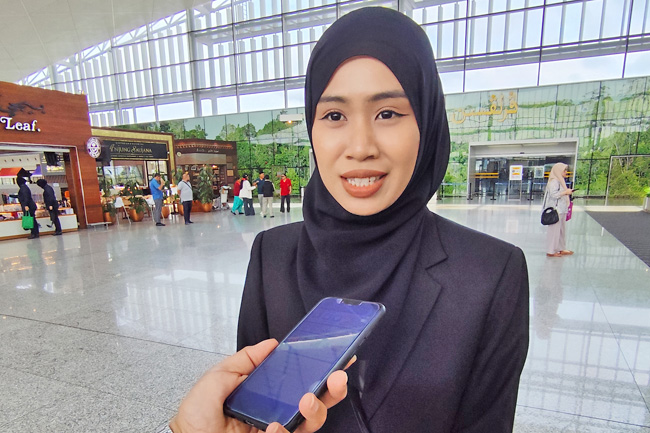
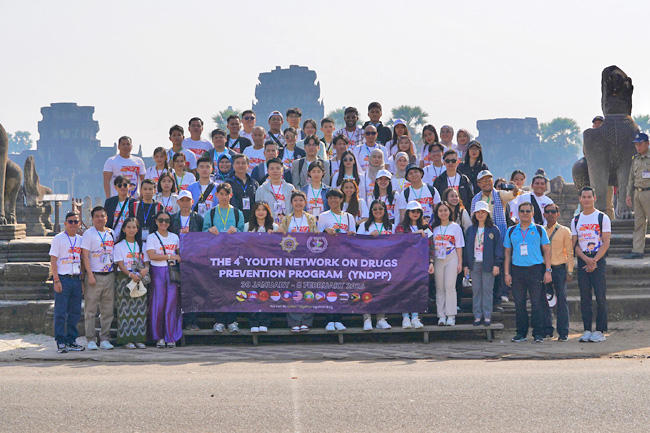
BRUNEI’S DRUG PREVENTION EFFORTS
Another participant, 23-year-old Nurizzah Hidayah binti Haji Md Ali, a final-year student at Universiti Brunei Darussalam’s (UBD) Academy of Brunei Studies, believes that drug prevention education, especially for youth, is of paramount importance.
Having completed an internship at NCB, she has gained invaluable insight into Brunei’s drug prevention efforts and the crucial role awareness plays in curbing substance abuse.
Her experience at NCB helped her prepare for her presentation on the drug situation in Brunei, focusing on preventive measures and the bureau’s relentless efforts in education and enforcement.
I have been studying drug-related issues in Brunei, and this research has been instrumental in preparing me for this programme.
“I aim to present how NCB has been working tirelessly on preventive education through school roadshows and major enforcement operations,” she explained.
Nurizzah’s final-year research project focuses on drug preventive education in Brunei, making her participation in the programme even more relevant.
“This programme is a bonus for my research project as it allows me to compare drug prevention approaches in different countries. Understanding how others tackle this issue will help me contribute fresh ideas to Brunei’s efforts,” she noted.
She emphasised that keeping Brunei drug-free should not be solely NCB’s responsibility.
“Although NCB plays a vital role, tackling this issue requires collective efforts from the entire community.
“When we return, my fellow participants and I will present our findings to the NCB director, sharing insights from the programme and exploring ways to strengthen our nation’s preventive strategies.”
Nurizzah also highlighted the importance of changing societal attitudes towards former drug users.
“Many people know drugs are dangerous, but they don’t realise the broader consequences, such as their impact on families and communities. We need to stop turning our backs on those who have completed rehabilitation.
“Rejection can push them back into old habits. Instead, we should support them in reintegrating into society,” she stressed.
LESSONS FROM THE YNDPP
The YNDPP features a diverse range of activities, including lectures, workshops, visits to drug prevention institutions, and networking opportunities with youth from other countries.
These initiatives align with ASEAN’s Drug Prevention Education campaign, aiming to raise awareness and strengthen preventive measures across the region.
One of the highlights of the programme was the 4th YNDPP Opening Ceremony, which provided an overview of past programmes and set expectations for youth delegates to learn from one another, foster strong relationships, and share insights on their respective countries’ drug situations.
During a study visit to the University of South-East Asia (USEA) in Cambodia, participants attended a presentation on Cambodia’s drug situation and the government’s innovative efforts to combat drug abuse, such as developing a mobile application to assist in prevention initiatives.
Delegates also engaged in networking sessions with USEA students, exchanging experiences and ideas.
A visit to Wat Rajabo Primary School was another eye-opening experience. The school’s principal shared how they incorporate holistic approaches beyond traditional education, such as meditation classes and community service, to promote student well-being.
This demonstrated how educational institutions can play a vital role in drug prevention by fostering a supportive environment for young people.
The programme also included a cultural excursion to Angkor Wat, allowing participants to appreciate the historical significance of the site while exchanging knowledge about their own countries’ cultural heritage.
This broader perspective helped reinforce the idea that drug prevention must be integrated with cultural values and societal structures.
BRINGING KNOWLEDGE BACK HOME
NCB hopes that the insights gained by Brunei’s representatives will contribute to ongoing drug prevention efforts in the country.
Upon their return, the students will play a key role in strengthening Brunei’s preventive education initiatives, particularly by sharing their newly acquired knowledge with local youth.
To maximise the programme’s impact, NCB plans to involve the students in a post-programme project aimed at enhancing Brunei’s drug prevention strategies.
This initiative, which will be funded by NCB, is expected to focus on at-risk groups, particularly the underprivileged, who are more vulnerable to falling into the cycle of drug abuse.
The YNDPP has provided Brunei’s delegates with a deeper understanding of drug prevention efforts beyond their homeland, allowing them to bring home valuable strategies that can be adapted to the local context.
Through their participation, they have gained fresh perspectives, built meaningful networks, and, most importantly, strengthened their commitment to making Brunei a safer, drug-free nation.
As Ghazi, Nurizzah, and their fellow delegates prepare to share their experiences with NCB and the wider community, their journey serves as an inspiring example of how youth can play a pivotal role in shaping the future of drug prevention in Brunei and beyond. – Lyna Mohamad






